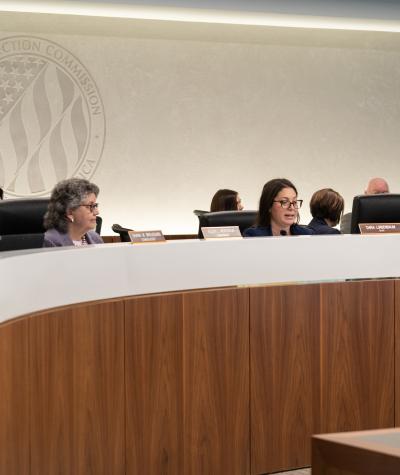The integrity of the electoral process depends on transparent public disclosure of who is spending money on elections. Voters have a right to know who is trying to influence their vote.
One tactic special interests use to keep their political spending secret is by enlisting a “straw donor” — which may be an individual or an LLC, trust, or other corporate entity that is used to funnel the contribution to a super PAC or other recipient so that the true contributor’s name doesn’t appear on the public campaign finance reports that allow voters to know who is spending in elections. Using “straw donor” schemes violates federal campaign finance laws and harms democracy.
Unfortunately, the Federal Election Commission (FEC) – the agency responsible for upholding electoral transparency by enforcing federal campaign finance laws – appears poised to make it easier to facilitate straw donor schemes. Campaign Legal Center (CLC) is urging them to avoid that path.
Federal regulations currently prohibit helping or assisting any person in making a straw donation. The “help or assist” regulation is important because it ensures accountability for the people who coordinate or facilitate straw donations, even when they aren’t the source or recipient of the contribution. But in 2018, a federal district court in Utah ruled against the FEC in a case where the Commission sought to enforce the “help or assist” regulation and concluded that the regulation was invalid.
After that 2018 decision, the FEC stopped enforcing the “help or assist” regulation but took no action to remove it – so the rule remains on the books. Now, after five years, the FEC is taking steps to repeal the regulation and claims that it is required to do so based on the district court’s ruling.
The FEC is wrong. Supreme Court decisions and the FEC’s own past practice make clear that it can enforce the help or assist regulation in other jurisdictions, and its planned repeal would unwisely remove an important electoral safeguard.
On June 23, 2023, CLC filed a comment with the FEC urging it not to repeal the help or assist regulation. The letter makes two points: first, that the FEC has the discretion to not only leave the “help or assist” regulation in place, but to continue enforcing it in other jurisdictions, and second that the FEC should avoid repealing the “help or assist” regulation based on its important role and purpose in the federal campaign finance laws.
On the first point, federal courts have made clear that the FEC can continue to enforce the regulation outside of the Utah district court’s jurisdiction, as the FEC has done with other regulations that federal courts have invalidated in the past.
In a 1984 decision, the U.S. Supreme Court recognized that even if one court finds a regulation invalid, executive agencies like the FEC must be able to continue enforcing the regulation in other jurisdictions, allowing other courts to weigh in and fully develop important legal questions. And just last week, Justice Gorsuch explained in a detailed concurring opinion that when courts strike down agency regulations, it “strains our separation of powers” by inappropriately putting judges in a position more akin to legislators.
Even though the FEC didn’t appeal the 2018 decision and currently isn’t enforcing the help or assist regulation, its own past experience confirms that it may nevertheless continue to enforce the regulation. That’s exactly what the FEC did when the U.S. Court of Appeals for the Fourth Circuit struck down the regulation defining “express advocacy” — the FEC continued enforcing its regulation in other circuits, noting that this approach was “the norm” for an agency faced with an adverse court decision.
Clearly, the FEC’s stated rationale for repealing the help or assist regulation reflects a misreading of precedents and its own prior statements. The ultimate effect of repealing the regulation would be allowing corrupt conduct to go unpunished, an absurd and unjust outcome.
On that second point, CLC’s comment notes that repealing the “help or assist” regulation would undermine the effectiveness of other campaign finance laws, including disclosure requirements and contribution limits.
For example, a political operative might set in motion a plan to funnel a contribution from a corporation through a nonprofit entity (which isn’t required to disclose its donors) to a super PAC. The super PAC might then disclose the nonprofit, not the corporation, as the true source of the funds. The operative is clearly central to the conduit contribution scheme, and the upshot is that voters are denied the truth about the corporation spending money to influence elections.
Yet without the “help or assist” regulation,” the operative who coordinated the whole scheme would not be held accountable. They weren’t the source, recipient, or intermediary transmitting the funds, but were just as integral to, and thus just as culpable for, the unlawful conduct.
Federal campaign finance law requires every political contribution to be made and disclosed in the name of the actual contributor who provides the funds. The “help or assist” regulation makes sure that someone cannot organize or facilitate an illegal straw donor scheme that undermines these fundamental disclosure requirements.
Laws and regulations prohibiting straw donor schemes are essential to preventing corruption, upholding transparency, and protecting voters. The FEC must do its job and keep this regulation on the books.
This post was written by Kristen Roehrig, a 2023 CLC summer legal intern.
